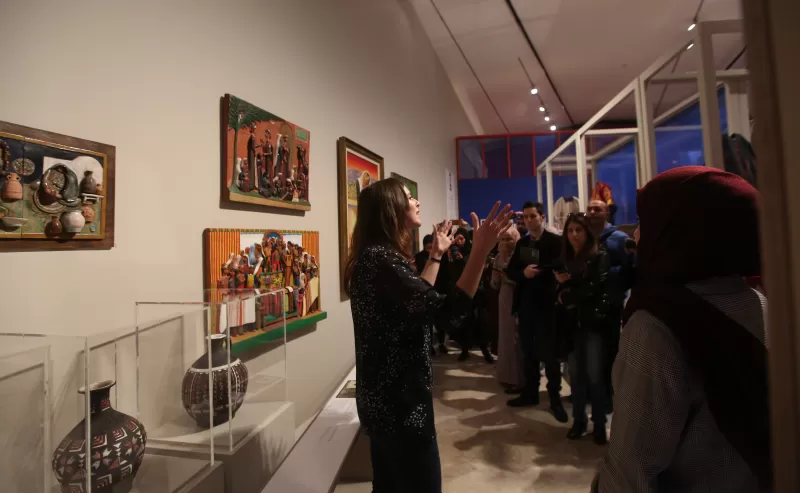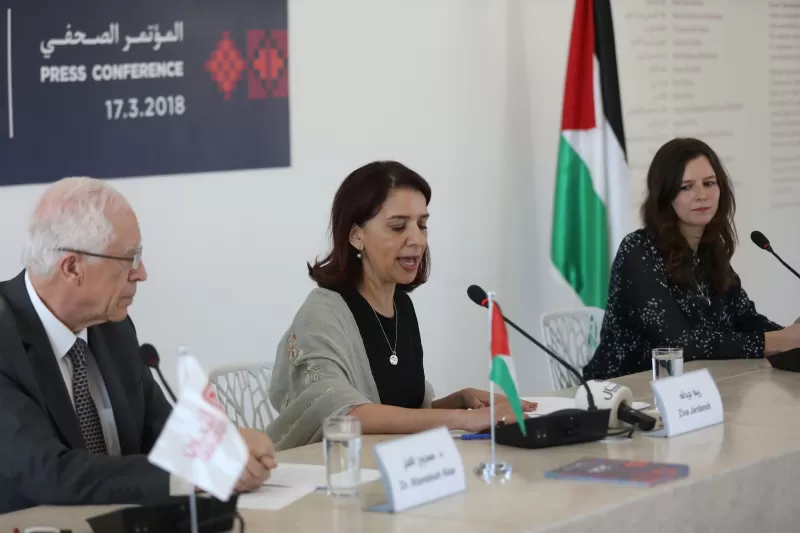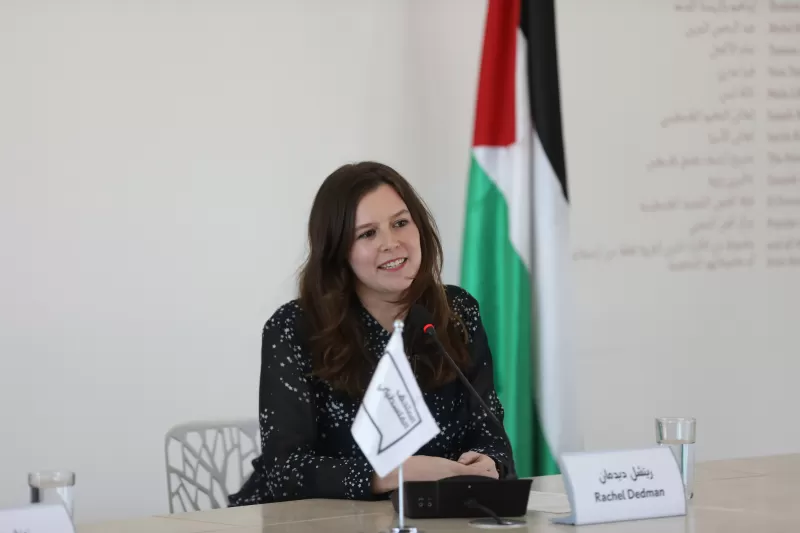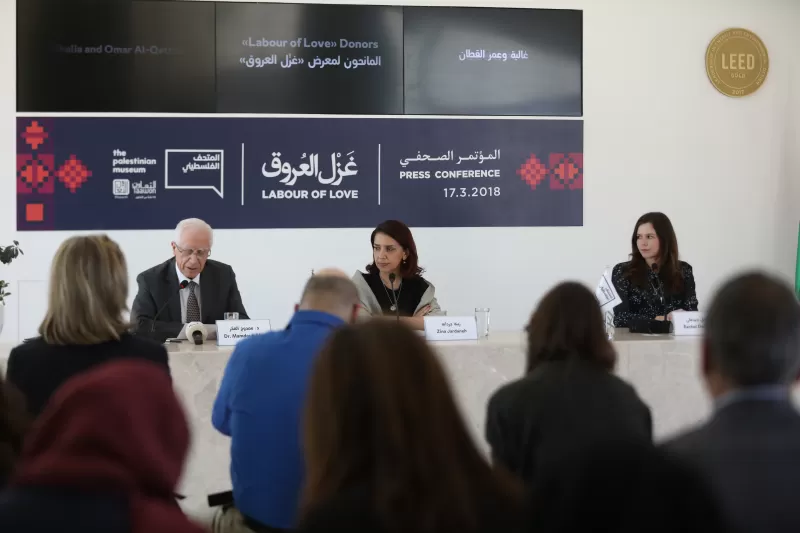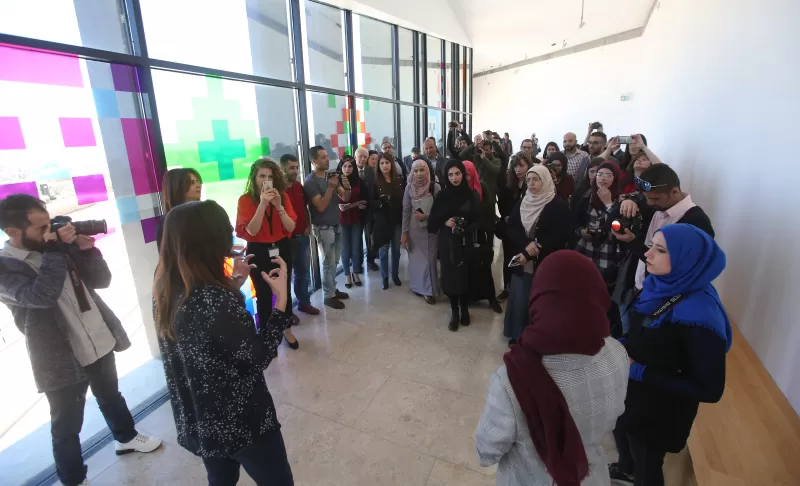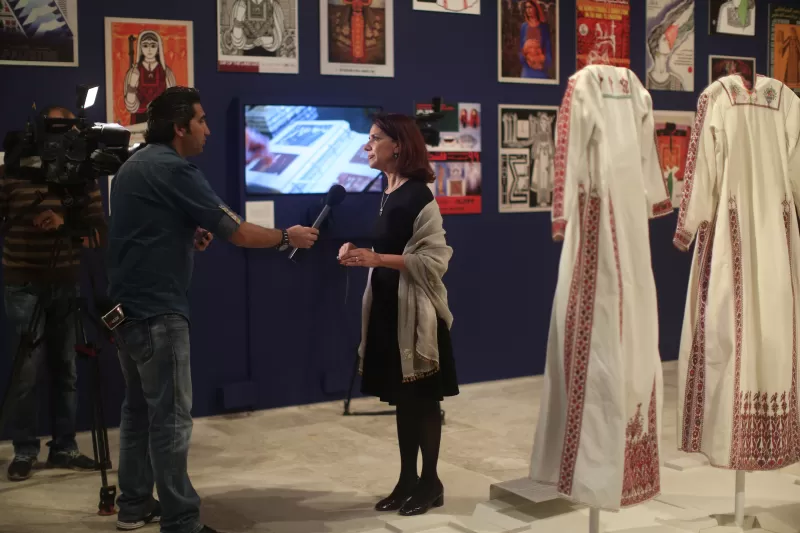The Palestinian Museum announced the opening of its exhibition Labour of Love: New Approaches to Palestinian Embroidery, which will run until 25 August, 2018. The announcement was made at a press conference held at the Museum in Birzeit.
Labour of Love explores Palestinian embroidery through the lenses of gender, labour, symbol, capital and class, tracing its shift from a personal practice to a symbol of national heritage, and the implications of its commodification today. The exhibition seeks to present a complex picture of Palestinian material history through the display of over 80 historic Palestinian dresses and accessories drawn from every region of Palestine, posters, paintings, archival photographs, music, literary materials, and a newly-commissioned video.
The exhibition Labour of Love crowns four years of extensive fieldwork and archival research in embroidery, expanding upon a previous exhibition, At the Seams: A Political History of Palestinian Embroidery, mounted by the Palestinian Museum two years ago in Beirut as its first exhibition outside of Palestine. It has now been relocated to its land of origin, Palestine.
Zina Jardaneh, Chair of the Board of the Palestinian Museum, stated that “the Museum strives to present quality exhibitions and programmes that address vital issues in Palestinian consciousness,” adding that “from the start we firmly believed that culture, knowledge and open-mindedness are the weapons that empower Palestinians and strengthen Palestine’s position and presence worldwide. Thus, the Museum holds a clear vision of extracurricular learning and the engagement of all sectors of society in cultural activity. For this purpose we have designed a programme rich in educational activities and public events that will be held throughout the duration of the exhibition.”
Palestinian Museum board member Dr. Mamdouh Aker went on to say: “We called our last exhibition Jerusalem Lives, bringing the isolated city of Jerusalem to the forefront, and making it prominent in the imagination and thought of those displaced from it. Today, in Labour of Love we celebrate a heritage that has long sustained Palestine, and we look at embroidery with new eyes. Through this exhibition we also promote learning through discovery and thinking outside the usual frameworks.”
Labour of Love curator, Rachel Dedman, said that the exhibition tells unique, little-heard stories, explaining that each dress in the exhibition carries a history of its own, while also emphasizing that embroidery is not limited to the thobe. “As you see in the exhibition, Palestinian embroidery in the last hundred years has taken on life as image, symbol, commodity, means of resistance, as a source of pride, and strength. This exhibition seeks to reflect, examine and connect all of these.” She ended her speech by stating that Labour of Love stems from the belief that embroidery is both a product, and an agent of historical and political change. By claiming love as a political act, the exhibition argues that Palestinian embroidery might be a small but mighty lens through which Palestinian history can be examined and explored.
This new presentation by the Palestinian Museum comes at a time when the Welfare Association (Taawon), the parent organisation of the Palestinian Museum, is marking the completion of 35 years of continuous development and humanitarian work in Palestine and with the Palestinian diaspora.
The Palestinian Museum wishes to thank the donors of the exhibition: The Arab Fund for Economic and Social Development, Bank of Palestine, Linbury Trust, and Ghalia and Omar Al-Qattan.
The Palestinian Museum also gratefully acknowledges the important and valuable contributions made by individuals and institutions who loaned items from their collections: The Palestine Heritage Museum - Dar Al-Tifl Al-Arabi, Birzeit University Museum, Tiraz: Widad Kawar Home for Arab Dress, Bank of Palestine, In’ash Al-Mukhayyam Al-Filastini; Inash Al-Usra; Maha Abu Shosheh, George M. Al Ama, Malak al-Husseini Abdulrahim, Tamam Al-Akhal, the Issam Badr family, Ibrahim and Krista Ladaa, Vera Tamari, Abdul Rahman Al Mozayen, Naila Libbes, the Palestine Poster Project Archive; Zawyeh Gallery, El-Funoun Palestinian Popular Dance, the Popular Art Center, and all those who generously shared items from their personal archives.
Rachel Dedman is an independent curator and writer based in Beirut since 2013. She curates and writes for institutions, collections and informal contexts internationally. Recent projects include Kindling for the Fotopub Festival (Slovenia); Midad: The Public and Intimate Lives of Arabic Calligraphy, for Dar el-Nimer (Beirut); Halcyon for the Transart Triennial (Berlin); Unravelled for the Beirut Art Center and At the Seams for the Palestinian Museum (Beirut). Rachel studied at the Universities of Oxford and Harvard, specialising in Islamic art history and contemporary art from the Middle East.
The Palestinian Museum is an independent institution dedicated to supporting an open and dynamic Palestinian culture nationally and internationally. The Museum presents and engages with new perspectives on Palestinian history, society and culture. The Museum is a flagship project of the Welfare Association (Taawon), an independent non-profit organisation, committed to providing development and humanitarian assistance in Palestine and the Palestinian communities in Lebanon.
